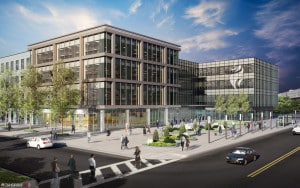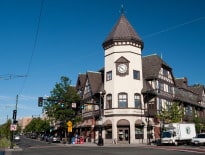
Related Beal and Kavanagh Advisory Group are planning a 125,000-square-foot office and lab complex in Boston’s Raymond L. Flynn Marine Park, as life science tenants consider alternatives to East Cambridge.
For life science companies in expansion mode, the usual alternative to high-cost, vacancy-starved Kendall Square has been suburban office parks off Route 128.
Now seasoned developers such as Davis Cos. and Related Beal are betting that market conditions are ripe to enlarge life science clusters in Boston’s Seaport District, Cambridge’s Alewife and inner-ring suburbs.
“You’re going to start to see some of the early-stage companies go to the Watertowns and the Seaports of the world, which we haven’t seen in the past,” said Mark Winters, executive managing director for Newmark Grubb Knight Frank.
Davis Cos. is laying the groundwork for lab expansion in Alewife. It received city approval on Dec. 12 to renovate and expand 35 Cambridge Park Drive into nearly 190,000 square feet of office and lab space opposite the MBTA Red Line station. The space is expected to be available in mid-2018.
Davis Cos. “have the capital and the ability to create the best biotech lab building in the Alewife market without question,” said Brendan Carroll, director of intelligence for Boston-based Encompass Real Estate Strategies. “It’s the perfect landing point for public transit accessibility and the more seasoned biotech workers who live in the western suburbs.”
While Alewife offers steep rent discounts compared to East Cambridge, the neighborhood has battled the reputation of a suburban environment with downtown traffic congestion. But Cambridge developer King Street Properties’ recent lease-up of vacant former Pfizer lab buildings on Cambridge Park Drive confirmed the neighborhood’s ability to attract early-stage biotech companies. The lab vacancy rate now stands at 0.0 percent in the 627,000-square-foot Alewife submarket, according to Encompass data.
Related Beal is planning a speculative 125,000-square-foot office and lab complex on Tide Street in Boston’s Raymond L. Flynn Marine Park, as the first phase of a 355,000-square-foot complex. It added to its Seaport holdings in December with the acquisition of the ground lease for 27 Drydock Ave. The 286,000-square-foot converted Army warehouse in recent has become home to life science tenants Ginkgo Bioworks, InviCRO and Emulate as well as Dana-Farber Cancer Institute offices and research space. Related Beal says it plans to make “strategic capital investment” to the property to attract R&D tenants.
The arrival of Related Beal – which has a track record of repositioning lab complexes such as One Kendall Square – bodes well for 27 Drydock’s prospects, Winters said.
“One of the things we hear in the Seaport is, ‘Who owns it?’” Winters said. “Now you’ve got a lab guy who’s done it and is willing to make the investment. The only question is: can Kendall Square companies get there quickly?”
In Watertown, Cresset Partners is marketing up to 120,000 square feet of office or lab space at 65 Grove St., the former GE Ionics factory that it acquired in 2014.
East Cambridge’s chronic shortage of lab space reflects intense demand from life science startups looking to grow in the shadow of MIT and potential venture capital backers, as well as pharmaceutical giants’ determination to tap into Greater Boston’s well-educated labor pool.
Even after absorbing 1.3 million square feet of lab space in 2016, Cambridge addresses are being sought by lab users for another 750,000 square feet. Major tenant requirements include Johnson & Johnson, Eli Lilly, Abbvie, Shire and Astellas Pharma US, according to Newmark Grubb Knight Frank.
That’s expected to drive rents even higher in a market where gross leases for some class A properties top $100 per square foot, Winters said. Kendall Square lab vacancies ended the year at 2.4 percent.
Lexington, a traditional relief valve market for Cambridge, appears positioned to lead suburban life science markets in the short term. Irish pharma giant Shire’s 200,000-square-foot expansion at 95 Hayden Ave. last summer gave it over 1.9 million square feet of suburban office and lab space in seven Massachusetts communities, before committing in November to another 343,000 square feet at BioMed Realty’s 500 Kendall St. in Cambridge.
Anticipating continued industry growth, King Street Properties acquired the former Cubist Pharmaceuticals campus in Lexington in November for $167 million. King Street plans to convert a vacant 215,000-square-foot lab building at 65 Hayden Ave. into multitenant space marketed to life science startups.
Other life science companies scouting suburban sites include Alexion Pharmaceuticals, which has an expiring lease at 33 Hayden Ave. in Lexington, and Astellas, which is looking as far as the central Route 495 submarket, said Mark Roth, an executive managing director for Newmark.
The industry’s local expansion has potential to accelerate, Encompass’s Carroll noted. While four of the industry’s seven largest companies occupy more than 300,000 square feet in Massachusetts, only Waltham-based Alere and Cambridge-based Biogen Idec are headquartered in the Bay State. Shire, the industry’s largest space occupier in Massachusetts, ranks behind 21 others in annual revenues.
“There are dozens of Shires that are not here yet,” Carroll said.







